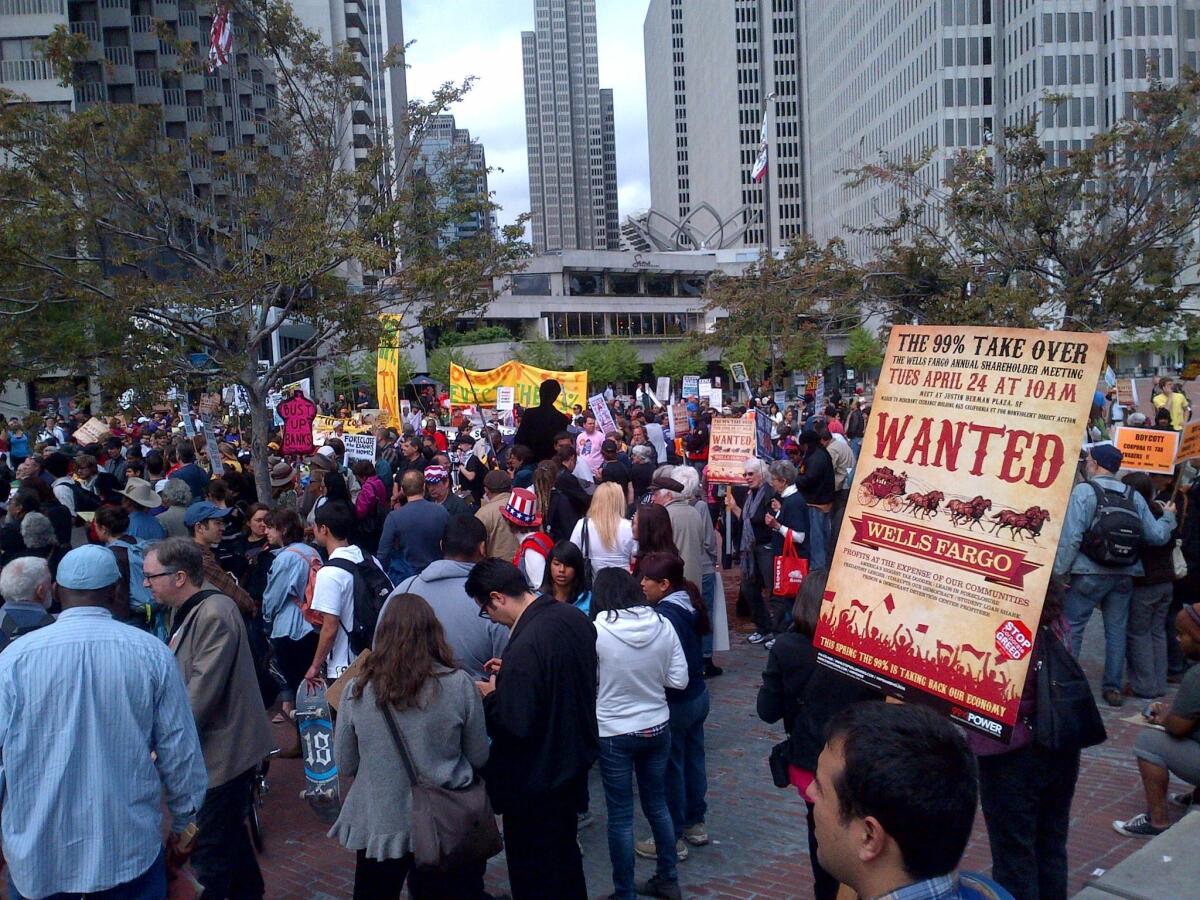Wells Fargo says federal law bars L.A. from suing over customer abuses

Wells Fargo & Co. has asked a court to rule that L.A. City Atty. Mike Feuer has no authority to sue the bank for abusing customers. Above, protesters at the bank’s annual meeting in 2012.
Federal law precludes the city of Los Angeles from suing Wells Fargo & Co. on behalf of Californians stuck with unwanted accounts and bogus fees, the San Francisco bank argued in its effort to toss the consumer protection lawsuit the city brought against it.
Laws dating back to the National Bank Acts, adopted in 1863 and 1864 when Abraham Lincoln was president, means banks like Wells Fargo are accountable only to federal regulators, the bank contended in a filing last week with the Los Angeles County Superior Court.
“The city’s claims are barred,” the bank said in the court document.
Wells Fargo said the Office of the Comptroller of the Currency, which is the Treasury Department agency that regulates national banks, and other federal agencies have jurisdiction to regulate national banks, “and those agencies have enacted comprehensive regulatory policy governing national banks.”
The comptroller’s office would not comment on whether it would back Wells Fargo’s attempt to have L.A.’s consumer-protection lawsuit tossed out.
Los Angeles City Atty. Michael N. Feuer disputed the claim that the city can’t bring suit.
The city’s lawsuit, filed last month, alleged that the bank’s sales quotas are so rigid that employees, desperate to meet them, have opened unauthorized accounts and provided other unwanted services for customers, sticking them with bogus fees and damaging their credit.
“Of course, we have the right to sue Wells Fargo for its alleged misconduct,” Feuer said Monday.
“I’d note that in defending against our allegations, Wells asserts, ‘The conduct complained of is expressly or implicitly permitted by statute and or/regulation.’” Feuer said. “I wonder how Wells’ customers will feel about that.”
Feuer’s investigation stemmed from a December 2013 Times story that described how Wells Fargo staffers, fearing retribution from managers, begged family members to open ghost accounts, opened accounts that they knew customers didn’t want, forged signatures and falsified phone numbers so angry customers couldn’t be reached for satisfaction surveys.
The lawsuit, seeking civil penalties against the bank and restitution for the alleged victims, alleged that some employees raided client accounts for money to open additional accounts.
Wells Fargo, it alleged, “has generated a virtual fee-generating machine, through which its customers are harmed, its employees take the blame and Wells Fargo reaps the profit.”
In its response, Wells denied all the allegations and challenged Feuer’s authority.
A day later, it filed a motion in U.S. District Court in Los Angeles seeking to have the lawsuit heard in the federal venue.
It said among other things that international banking claims must be heard in federal court. One of Feuer’s claims was that Wells Fargo employees falsely told some customers that checking accounts automatically came with another service enabling funds to be sent to other countries.
The bank’s federal filing took a skeptical view of the fact that Feuer so far has not identified either individual employees who were pressured into wrongdoing or customers who were victimized.
“Plaintiff alleges that unspecified employees of Wells Fargo Bank in unspecified branch offices at unspecified times opened unauthorized accounts for unspecified customers,” the motion said.
“Plaintiff alleges, among other things, that employees ‘were ... instructed by [unspecified] management to lie to customers.’”
Feuer said he would oppose a motion to transfer his suit to federal court.
Before civil cases can be heard in U.S. District Court, they generally must go through private or court mediation to try to reach a settlement.
Meantime, a Superior Court status conference is scheduled for Sept. 1.
Follow @ScottReckard for news of banks and home loans
More to Read
Inside the business of entertainment
The Wide Shot brings you news, analysis and insights on everything from streaming wars to production — and what it all means for the future.
You may occasionally receive promotional content from the Los Angeles Times.











